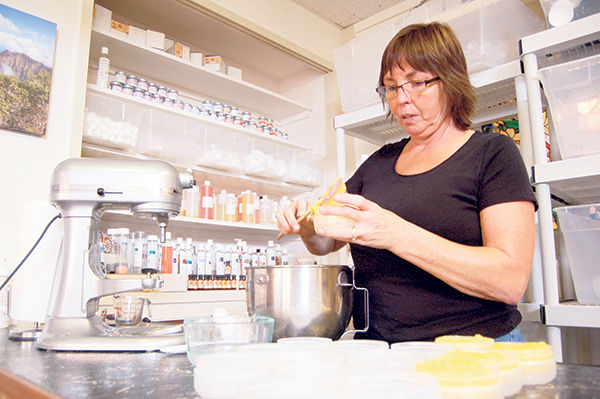LIHUE — The county isn’t expecting an increase in revenue from the state in transient accommodations taxes that each county receives. So one proposal Mayor Bernard Carvalho Jr. and three other county mayors are pitching to help balance their budgets
LIHUE — The county isn’t expecting an increase in revenue from the state in transient accommodations taxes that each county receives.
So one proposal Mayor Bernard Carvalho Jr. and three other county mayors are pitching to help balance their budgets is to temporarily enact an up to 1 percent surcharge on top of the state’s 4 percent general excise tax for counties to use.
The proposal, Kauai County Tax Manager Steve Hunt said, would allow the Kauai County Council to determine how those surcharge revenues would be spent.
“Just having the authority to enact the GET as temporary stopgap to get through a budget cycle, to me, makes perfect sense to have something as a Plan B,” Hunt said.
But not everyone is on board.
Cori Beck, co-owner of Garden Isle Bath and Body, LLC, in downtown Kapaa, said she and her husband make all of the lotions, shampoos, soaps and other products in her store from scratch.
An additional surcharge on top of the current general excise tax, Beck said, would place an additional financial burden on her business by forcing her to pay more for the raw materials used in her products.
“I think 1 percent is a big increase — when you’re talking about every single merchant paying the GET, could you imagine how many billions of dollars that would pull in?” Beck said. “It’s devastating to the small business industry and for people like me who own a mom-and-pop shop. Having an additional 1 percent tax would generate a lot of revenue for them, and I would like a little explanation as to what they’re going to do with all of that money.”
Wailua Homesteads resident Dr. Bob Brown said he owns and operates a transient accommodation rental out of his home and would rather see the state’s four counties get more of their individual share of the TAT that he must pay.
“I think every county should get 100 percent of the TAT, and if we could do that, that’s much better than raising the GE tax,” Brown said. “In no way would I support the county in increasing taxes at this time, but I would support, in every way I can, to get the TAT that the county deserves — I don’t think the state should be tapping into that.”
While the county didn’t have an estimate on how much extra revenue would be provided, some county councilmembers are already opposed to the plan.
Kauai County Councilwoman JoAnn Yukimura said implementing a GET surcharge for general purposes is inappropriate.
“The GET is a very regressive tax, which means that it impacts the working-class and lower-income residents much harder than others because a greater percentage of their income goes to necessities,” Yukimura said. “To put that burden on them for general purposes is not good policy.”
Councilman Gary Hooser agreed and said he is “absolutely opposed to raising taxes and will not support the mayor’s effort to increase the general excise tax on our community.”
“I’m very concerned and very disturbed that there’s this effort now to raise taxes again on our citizens,” Hooser said. “Yes, we have a lot of needs, yes, there’s a lot of things that we need to do like roads and whatnot, but we need to get our financial house in order before we even discuss raising taxes.”
Councilman Arryl Kaneshiro said he wasn’t sure what state lawmakers would decide, but was concerned a surcharge wouldn’t be well received locally.
“Obviously, for the county, any more money is a good thing, but I’m not sure how willing the state is to allow us to do that or what the blowback will be on the community, because, basically, we’d be taxing everybody more,” he said.
Though no proposal has been formally introduced before the Legislature, some lawmakers question whether a county surcharge on top of the general excise tax is a viable option.
“I don’t think it’s going to be received favorably because the state needs to control the GET,” said Rep. Daynette “Dee” Morikawa, D, Koloa-Niihau. “I guess a lot of us are hearing about how people are struggling with taxes and fees, so we really need to rein in on some of those costs or expenses. For me, personally, I don’t like raising any more taxes on Kauai people — it’s too much of a hardship.”
Judy Brunstad, a part-time resident from Meredith, New Hampshire, agreed and said residents on Kauai already pay more for necessities, such as groceries, than people living on the Mainland.
“Coming from the Mainland, there’s a huge difference in the price of food alone, so I’m not sure if people could afford to pay another 1 percent,” Brunstad said. “Just thinking of the cost already, it is just too much. Some people are just struggling to get by here.”
As an alternative, Yukimura said it would be better for county officials to push for a 0.5 percent general excise tax surcharge that would be earmarked for public transportation — an existing tax provision that was approved by the Legislature in 2007 and implemented by the City and County of Honolulu to benefit the Honolulu Rail Transit Project.
“It goes back to help those people who are most hardest hit because they are the ones who not only use transit but need it to go to work, school or the doctor’s office,” Yukimura said. “It can be justified when it’s earmarked for transit, whereas I do not believe it can be justified for general purposes, which would include offsetting tourism impacts. Why would we do that off the backs of lower- and middle-income families?”


